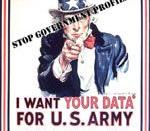3 October 2001
Privacy
You're standing in an airport and you do not know who is standing behind you. With new technology this process could be changing. Cameras that watch over public places and use face recognition technology to search for bad guys may become more widespread since the terrorist attacks on September 11, 2001. Cameras at airports and plazas are constantly taking photographs and then sent thru a database to be recognized against FBI most wanted lists. Such technologies can safeguard Americans from further terrorist's attacks, kidnappings, and possibly even murders.
Visionics Corporation assures the public that they are ready, willing, and able to participate in this new concept of security. "We are pleased to have received approval from the National Institute of Justice (NIJ) for the full deployment of this system," says Dr. Joseph Atick, chairman and CEO of Visionics Corporation (qtd. In Hempel par.3). These images are greatly used for identifying terrorists, kidnappers, murderers, bank robbers, and all those who need to be caught and dealt with accordingly.
Some might say that this is an invasion of privacy. Civil liberties activists are already uneasy. David Sobel, general counsel at the Electronic Privacy Information Center in Washington, said "there are obviously legitimate concerns about terrorism and we need to find effective means to meet the challenge." Sobel said, "he worries that officials are rushing ahead in some cases without considering the implications (qtd. in O'Harrow par.12)."
Few people may know that the invasion of privacy act is in some ways violated in the workplace. New technologies make it possible for employers to monitor many aspects of their employee's jobs, especially on the telephone, computer terminals, voicemail, and on the Internet. Such monitoring is virtually unregulated. Therefore, unless company policy specifically states otherwise, your employer may listen, watch,



Very Good
I feel that this essay was easy to read and very well written.
18 out of 18 people found this comment useful.